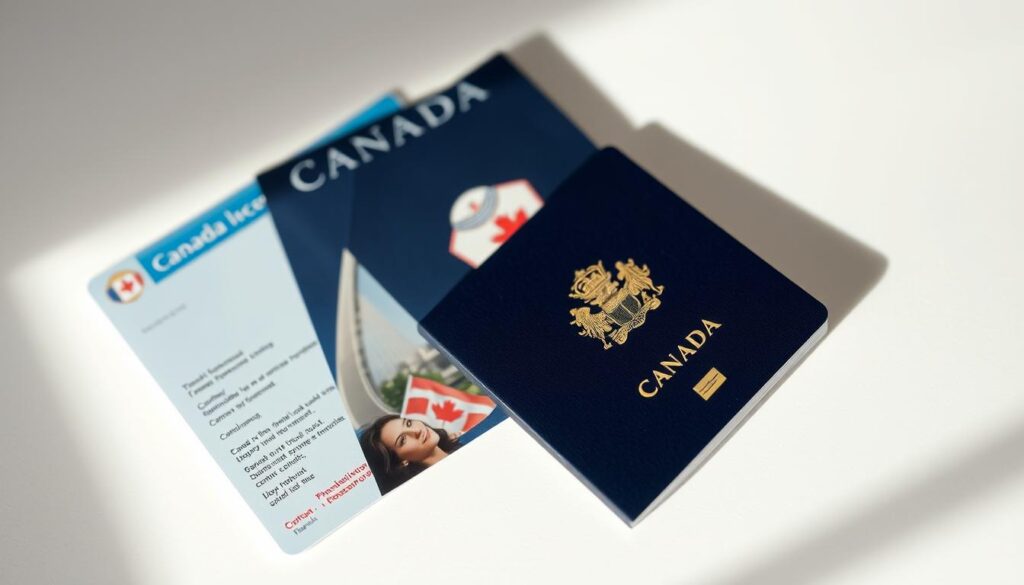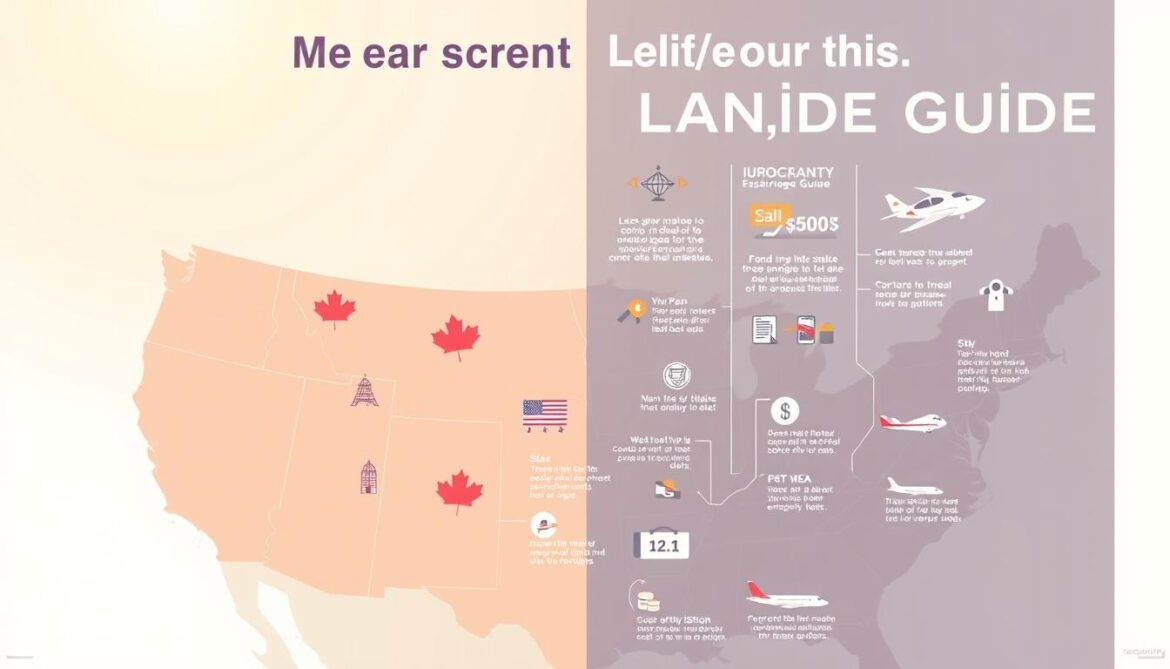Did you know over 10,000 Canadian citizens relocate south of the border annually? Whether you’re a permanent resident or exploring new opportunities, cross-border transitions involve careful planning. This guide simplifies the process.
Early collaboration with experts like SWAN Wealth or MTFX ensures smooth adjustments. Key areas include visa applications, tax obligations, and healthcare adjustments. Always verify details through the Canada visa portal for accuracy.
From legal requirements to financial prep, we cover must-know details. Stay informed and confident as you navigate this change.
Understanding the Basics of Moving to the United States from Canada
Adjusting to a new country involves understanding key differences in systems and laws. Whether you’re drawn by career prospects or warmer climates, preparation is essential.
Comparing Immigration Programs
Canadian citizens often qualify for the TN visa under USMCA, ideal for professionals. The H-1B visa, meanwhile, suits specialized roles but has stricter caps. Research both to align with your career goals.
Why Canadians Make the Move
Over 60% cite climate preferences, with Florida and Texas as top picks. The state of California lures tech talent to Silicon Valley. Others seek higher salaries in finance or healthcare sectors.
Tax and healthcare systems differ significantly. The IRS requires filing for global income, while Canada’s CRA has residency-based rules. Private insurance replaces universal healthcare, so budget accordingly.
Visa Requirements for Canadian Citizens
Navigating visa options requires understanding key eligibility rules. Whether you seek temporary work or permanent residency, each pathway has distinct steps. Below, we break down the most common routes.
Non-Immigrant Visa Options
The TN visa, part of the USMCA agreement, covers 60+ professions like engineers and accountants. Applications require:
- A job offer from a U.S. employer
- Proof of qualifications (degrees or licenses)
- Submission at a port of entry or consulate
“TN visas typically process within 1–3 weeks, making them ideal for quick relocations.”
Permanent Residency Pathways
For long-term stays, consider these options:
| Visa Type | Investment/Fee | Processing Time |
|---|---|---|
| EB-5 Investor | $900,000+ | 24–36 months |
| Family Sponsorship | $1,200–$1,750 | 6–24 months |
The Diversity Visa Lottery offers 50,000 annual slots. Apply early—winners still need biometrics checks via USCIS.
Navigating the Canada Visa Portal for US Relocation
Efficiently managing your visa process starts with the official IRCC platform. The Canada visa portal centralizes applications, tracking, and updates—saving time and reducing errors. Below, we break down key features and requirements.
Accessing the Portal Effectively
Create an account using your GCKey or Sign-In Partner credentials. The mobile-optimized design allows submissions on-the-go, but desktop use is recommended for complex forms. Enable browser autofill for frequent fields like name and birthdate.
Critical features include:
- Real-time tracking: Check application status anytime.
- Secure messaging: Receive updates directly in your inbox.
- Document library: Pre-upload frequently used files.
“23% of rejections stem from incorrect uploads—double-check file formats before submission.”
Document Checklist for Visa Applications
Prepare these essentials in digital format before starting your form:
| Document Type | Format Specs | Notes |
|---|---|---|
| Passport scan | PDF under 2MB | All pages, including blanks |
| Job offer letter | PDF or JPEG | Employer letterhead required |
| Proof of funds | PDF only | Recent 3 months’ statements |
For smoother processing, label files clearly (e.g., Smith_Passport.pdf). Avoid password-protected PDFs—they’ll trigger automatic rejection.
Essential Documents You’ll Need
Gathering the right paperwork ensures a smooth transition. Whether applying for a visa or proving financial stability, missing even one item can delay your status approval. Below, we outline must-have records and how to prepare them.

Personal Identification Requirements
A valid Canadian passport is mandatory for all visa types. Ensure it’s current and has blank pages for stamps. For French-language documents, like birth certificates, include a notarized English translation.
*Police clearance certificates* must be issued within the last six months. Use authorized providers for medical exams—find the list on the IRCC website. Diplomas or degrees require apostille certification if earned outside Canada.
Financial Proof Documentation
Single applicants need bank statements showing $5,000+ in available funds. Families should budget proportionally higher amounts. Recent statements (3 months) must be in PDF format—no password protection.
| Document | Specifications |
|---|---|
| Employment Letter | On company letterhead, signed |
| Investment Records | Notarized if self-funded |
“Submitting incomplete proof of funds accounts for 30% of visa delays.”
Financial Planning for Your Move
Smart financial planning eases cross-border transitions significantly. Budgeting for housing, taxes, and daily expenses ensures stability. Compare options early to avoid surprises.
Cost of Living Comparisons
Rent prices vary drastically. Toronto averages $2,400 monthly, while Houston sits at $1,200—a 50% saving. Factor in utilities, groceries, and transport for a full picture.
Closing a TFSA before relocating is mandatory. Withdrawals are tax-free in Canada but may incur U.S. state taxes. Consult a cross-border tax specialist for clarity.
Cross-Border Banking Solutions
RBC and TD offer dedicated U.S. accounts with seamless transfers. Key features include:
- No foreign transaction fees on select cards
- Linked Canadian and U.S. online banking
- Higher exchange limits for large transfers
“MTFX offers 0.5% better rates than big banks, saving thousands on large transactions.”
For currency exchanges, compare Wise and OFX. Wise suits frequent small transfers, while OFX excels for lump sums. Always check hidden fees.
Withdrawing from an RRSP? Tax implications differ by state. California taxes withdrawals as income, while Florida has no state tax. Plan withdrawals strategically.
Healthcare Considerations When Relocating
Accessing quality healthcare is a top priority when crossing borders. The systems differ significantly, requiring careful planning to avoid gaps in coverage. Start by comparing your options early.

How US Healthcare Systems Work
Unlike Canada’s universal model, most Americans rely on employer-sponsored insurance. Over 82% of full-time workers receive coverage through their jobs. Plans vary widely in cost and benefits.
Key differences include:
- COBRA: Temporary coverage if leaving a job (up to 18 months).
- ACA Marketplace: Subsidized plans for those without employer options.
- HMO vs PPO: HMOs restrict providers; PPOs offer more flexibility.
“Emergency care networks often charge out-of-network fees—verify hospitals in advance.”
Switching from Canadian Coverage
Provincial healthcare like OHIP provides a 212-day grace period after relocation. Use this window to secure new insurance. Prescription medications may require new prescriptions from US doctors.
Additional costs to budget for:
| Coverage Type | Average Annual Cost |
|---|---|
| Dental Add-On | $350–$600 |
| Vision Care | $150–$300 |
Check if your medications are available locally. Some Canadian prescriptions aren’t approved across the border. Carry a doctor’s note for controlled substances.
Finding Housing in the United States
The U.S. housing market offers diverse options for newcomers from Canada. Whether renting or buying, understanding local trends and regulations ensures a smooth transition. Start by evaluating your budget and long-term goals.
Rental vs. Buying Considerations
Renting provides flexibility, ideal for testing neighborhoods before committing. Short-term leases are common in cities like Miami or Phoenix. Buying may save costs long-term, especially in growing markets.
Key differences to note:
- HOA fees: Average $200–$500 monthly in Sun Belt states like Arizona.
- Security deposits: Texas caps them at one month’s rent; other state laws vary.
- Non-resident mortgages: Require 30–40% down payments and U.S. credit history.
Best Neighborhoods for Canadian Expats
Florida’s Miami-Dade County attracts 28% of Canadian buyers, thanks to its warm climate and tax benefits. Snowbird-friendly communities in Scottsdale, Arizona, offer seasonal amenities like golf courses and healthcare hubs.
Other top picks include:
| Location | Avg. Home Price | Key Perk |
|---|---|---|
| Raleigh, NC | $420,000 | Tech job growth |
| Fort Lauderdale, FL | $550,000 | Waterfront access |
“Zillow and Redfin list real-time inventory, but verify listings with a local agent—U.S. MLS systems update faster than Canadian platforms.”
Employment Opportunities for Canadians
LinkedIn’s U.S. platform lists triple the jobs compared to Canada. Whether you’re in tech or trades, strategic planning maximizes your chances. Focus on industries valuing Canadian experience.

Effective Job Search Strategies
Highlight specialized skills like oil/gas expertise for Texas roles or tech proficiency for Silicon Valley. U.S. employers often prioritize certifications—research state-specific licenses for fields like nursing or teaching.
Top platforms for applications:
- Indeed: Best for hourly and corporate roles.
- Monster: Strong for executive positions.
“Canadian applicants typically secure 15–20% higher salaries by negotiating U.S. market rates upfront.”
Navigating Work Visa Sponsorship
The L-1 visa suits intracompany transfers if your employer operates in both countries. Requirements include:
- 1+ year with the Canadian branch.
- Executive/specialized role.
| Job Platform | Ideal For | Response Rate |
|---|---|---|
| Tech/Finance | 42% | |
| Glassdoor | Salary Insights | N/A |
For business owners, the E-2 visa requires a substantial investment but offers flexibility. Consult an immigration lawyer for tailored advice.
Education Options for Your Children
Ensuring quality education for your children is a top priority when relocating. Differences in curriculum, grading, and support services require careful evaluation. Start by researching districts aligned with your family’s needs.
Comparing School Systems
International Baccalaureate (IB) programs are widely available in major cities, while Advanced Placement (AP) courses dominate suburban schools. IB emphasizes critical thinking, whereas AP focuses on subject mastery. Check transfer credit policies with prospective institutions.
For children with special needs, Individualized Education Plans (IEPs) may require reevaluation. U.S. schools often conduct new assessments—bring Canadian documentation to expedite the process.
| Program | Availability | Best For |
|---|---|---|
| IB Diploma | Urban areas | Global university prep |
| AP Courses | Nationwide | Subject specialization |
“Vaccination records are mandatory for enrollment—ensure your child’s immunizations meet CDC guidelines.”
Enrollment Procedures
Most districts use online portals for registration. Key steps include:
- Proof of residency: Utility bills or lease agreements.
- Academic transcripts: Translated if in French.
- Health forms: TB tests may be required.
Homeschooling regulations vary by state. Texas has minimal oversight, while Pennsylvania mandates portfolios and standardized testing. Verify local laws before committing.
Tax Implications of Relocation
Cross-border relocations bring unique tax challenges that require careful planning. Both Canada and the U.S. have distinct rules for residents and non-residents. Failing to comply could lead to penalties or double taxation.

Canadian Tax Obligations After Moving
Canada’s CRA may still consider you a tax resident if you maintain ties like property or family. File Form NR73 to confirm your status. Key considerations:
- Section 216 returns: Required for rental income from Canadian properties.
- Deemed disposition: Selling assets before leaving may trigger capital gains tax.
“FBAR penalties for unreported foreign accounts can exceed $10,000 per violation.”
US Tax Filing Requirements
The IRS taxes global income for residents. Key forms include:
| Form | Purpose | Threshold |
|---|---|---|
| 8938 | Foreign asset disclosure | $200,000+ |
| 1040 | Annual income tax | All filers |
Choose between FTC (Foreign Tax Credit) or FEIE (Foreign Earned Income Exclusion). FTC suits high Canadian taxes; FEIE benefits those with lower incomes.
State taxes vary—Texas has none, while Washington taxes capital gains. Research local laws to optimize your strategy.
Transporting Your Belongings Across the Border
Crossing the border with your possessions requires careful planning to avoid delays. Customs rules vary, and missing details can lead to hold-ups or fines. Start by researching what you can bring and how to declare it properly.
Customs Regulations for Household Goods
Declare all items valued over $2,000 USD using Form 3299 for temporary imports. Failure to report high-value goods may result in penalties. Common prohibited items include:
- Plant cuttings or soil (requires USDA permits)
- Firearms (special licenses needed)
- Certain medications (check FDA guidelines)
“Alcohol and tobacco allowances: 1L of liquor and 200 cigarettes per adult duty-free.”
Choosing Between Movers and DIY Options
Compare costs and convenience before deciding. Professional movers handle paperwork but charge premiums. DIY options like U-Haul are cheaper but require more effort.
| Option | Avg. Cost (Toronto to NYC) | Best For |
|---|---|---|
| Full-Service Movers | $4,500–$7,000 | Large households |
| PODS Containers | $2,800–$3,500 | Flexible timelines |
For pets, ensure vaccinations are up-to-date. A rabies certificate issued within 30 days is mandatory. Airlines may require additional health forms.
Cultural Adjustments to Prepare For
Understanding regional differences helps smooth your transition. From etiquette to local traditions, small details impact daily life. Over 25% of newcomers report initial challenges with healthcare systems—highlighting the need for research.

Navigating Social Norms
Expect variations in social customs. Tipping, for example, averages 20% in restaurants—higher than Canada’s 15% standard. Political conversations may feel more polarized; gauge comfort levels before engaging.
Key contrasts include:
- Sports culture: NFL games dominate weekends, unlike CFL’s smaller fanbase.
- Regional dialects: Southern states use terms like “y’all” or “bless your heart” frequently.
“Healthcare navigation ranks as a top stressor for 1 in 4 Canadian expats during their first year.”
Building Community Connections
Finding your community accelerates adaptation. Join expat groups on Meetup.com or attend local events. Sports leagues, book clubs, or volunteer work offer organic networking opportunities.
Regional dialect examples:
| Term | Meaning | Common In |
|---|---|---|
| “Pop” vs. “Soda” | Carbonated drinks | Midwest/Northeast |
| “The 6” | Toronto | Canadian slang |
Embrace these cultural shifts with curiosity. Observing local habits—like smaller personal space in cities—helps blend in naturally.
Maintaining Ties With Canada
Staying connected to Canada while abroad involves strategic planning. Whether you pursue dual citizenship or frequently return, preserving benefits like CPP/QPP requires awareness. Below, we outline key considerations for seamless transitions.
Dual Citizenship Benefits
Holding passports for both countries offers flexibility. Canada permits dual citizenship, but the U.S. requires naturalization. Key advantages include:
- Voting rights: Cast ballots in Canadian federal elections.
- Banking access: Retain Canadian accounts for easier transfers.
- CPP/QPP: Continue receiving pensions abroad—no clawback unless OAS income exceeds $128,149.
“Snowbirds spending 183+ days in the U.S. may trigger tax residency—plan stays carefully.”
Streamlining Frequent Travel
For regular cross-border travel, enroll in the Nexus program. It cuts wait times and includes TSA PreCheck. Requirements:
| Feature | Benefit |
|---|---|
| Dedicated lanes | 90% faster clearance |
| Global Entry | Includes U.S. re-entry |
Keep a Canadian address for mail and taxes. Use services like Canada Post’s mail forwarding to stay updated. For healthcare, maintain provincial coverage during short absences—verify eligibility periods.
Common Pitfalls to Avoid
Simple errors can complicate your transition unexpectedly. Over 23% of applications face rejection due to incomplete forms. Proactive planning helps sidestep these hurdles.
Immigration Application Mistakes
Request for Evidence (RFE) delays are common. Top triggers include:
- Missing signatures: Double-check forms like DS-160.
- Expired documents: Passports must be valid for 6+ months.
- Inconsistent employment history: Match dates exactly.
“Unresolved RFEs add 60–90 days to processing—review checklists twice.”
Financial Oversights
Tax-free savings accounts (TFSAs) become taxable in the U.S. Withdrawals may incur penalties if not reported correctly. Case studies show:
| Issue | Cost | Solution |
|---|---|---|
| Unreported TFSA | 15% penalty | File Form 3520 |
| Credit history gaps | Higher loan rates | Use Nova Credit |
State-specific rules matter. Florida requires hurricane insurance, while California mandates earthquake coverage. Verify local laws early.
Creating Your Relocation Timeline
Strategic planning transforms a chaotic move into an organized journey. A clear timeline ensures you meet critical deadlines while balancing logistics. Break tasks into phases to avoid overwhelm.
Key Milestones in the Moving Process
Start tax planning 2 years pre-move—cross-border rules are complex. Use this 12-month checklist:
- 12–9 months prior: Research visas, hire a cross-border accountant.
- 6 months: Secure housing, submit school applications (deadlines: Jan 1 for Sept intake).
- 3 months: Schedule vehicle inspections for import registration.
“Healthcare enrollment periods are strict—miss them, and you’ll wait 6+ months for coverage.”
When to Initiate Each Step
Align tasks with seasonal trends. Housing markets peak in spring, while movers offer discounts in winter. Critical windows:
| Task | Ideal Start Time |
|---|---|
| Job applications | 6 months pre-move |
| Pet vaccinations | 90 days before travel |
Set reminders for IRS filings (April 15) and Canadian tax exit forms (due 30 days post-move).
Conclusion
Finalizing your relocation successfully requires attention to key details. This guide simplifies the process, but double-check visa forms, tax filings, and healthcare enrollments for accuracy.
Verify your checklist:
– Valid passports and work permits
– Updated financial records
– Cross-border tax consultations
Partnering with experts like SWAN Wealth or MTFX ensures compliance. Their tailored services help navigate currency exchanges and legal nuances seamlessly.
Start gathering documents early. Proactive planning reduces stress and sets the stage for a smooth transition. Your future begins with these organized steps.



